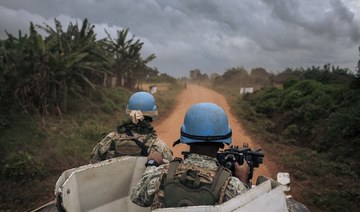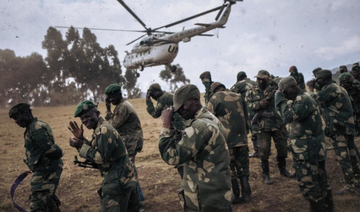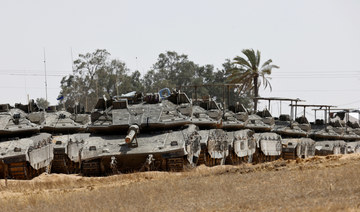BEIJING: China on Wednesday urged its citizens to leave three provinces in eastern Congo as violence intensifies in the mineral-rich region.
A posting from the Chinese Embassy in Kinshasa on the WeChat online messaging said a number of Chinese citizens had been attacked and kidnapped over the past month in the provinces of South Kivu, North Kivu and Ituri, where several anti-government rebel groups have a presence.
It said Chinese residing in the three provinces should provide their personal details by Dec. 10 and make plans to leave for safer parts of Congo. Those in the districts of Bunia, Djugu, Beni, Rutshuru, Fizi, Uvira and Mwenga should leave immediately, it said, adding that any who do not do so “will have to bear the consequences themselves.”
“We ask that all Chinese citizens and Chinese-invested businesses in Congo please pay close attention to local conditions, increase their safety awareness and emergency preparedness, and avoid unnecessary outside travel,” the embassy said.
No details of the incidents were given, although the embassy last month reported five Chinese citizens were abducted from a mining operation in South Kivu, which borders Rwanda, Burundi and Tanzania.
It warned a the time that the security situation in the area was “extremely complex and grim” and that there was little possibility of sending help in the event of an attack or kidnapping.
No details were given about those kidnapped, who they worked for or who was suspected of taking them.
Several armed groups including the Democratic Forces for the Liberation of Rwanda, known by its French acronym FDLR, the Mai-Mai and the M23 regularly vie for control of eastern Congo’s natural resources.
Despite the danger, Chinese businesses have moved into Congo and other unstable African states in a quest for cobalt and other rare minerals and resources. Chinese workers have also been subject to kidnappings and attacks in Pakistan and other countries with active insurgencies.
Security was a key topic at a meeting Monday in Dakar, the capital of Senegal, on Monday, between Chinese Foreign Minister Wang Yi and his Congolese counterpart Christophe Lutundula, according to China’s Xinhua News Agency.
China’s government and ruling Communist Party “attach great importance to the safety and security of Chinese enterprises and Chinese nationals overseas and the Chinese side has been extremely concerned with the recent serious crimes of kidnappings and killings of its citizens in the DRC,” Wang said, using the acronym for the Democratic Republic of Congo.
Wang urged Congo to secure the release of those kidnapped and create a “safe, secure and stable environment for bilateral cooperation.”
Xinhua quoted Lutundula as saying Congo would take “forceful measures” to investigate the crimes, free the hostages, punish the culprits severely and safeguard national security and restore stability to the country’s east.
Earlier this week, Uganda said it launched joint air and artillery strikes with Congolese forces against camps of the extremist Allied Democratic Forces rebel group in eastern Congo.
The ADF was established in the early 1990s in Uganda and later driven out by the Ugandan military into eastern Congo, where many rebel groups are able to operate because the central government has limited control there.
At least four civilians were killed less than two weeks ago in Uganda’s capital when suicide bombers detonated their explosives at two locations.
The Daesh group claimed responsibility, saying the attacks were carried out by Ugandans. Ugandan authorities blamed the ADF, which has been allied with the Daesh group since 2019.
China calls on citizens to leave eastern Congo after attacks
https://arab.news/6afc3
China calls on citizens to leave eastern Congo after attacks
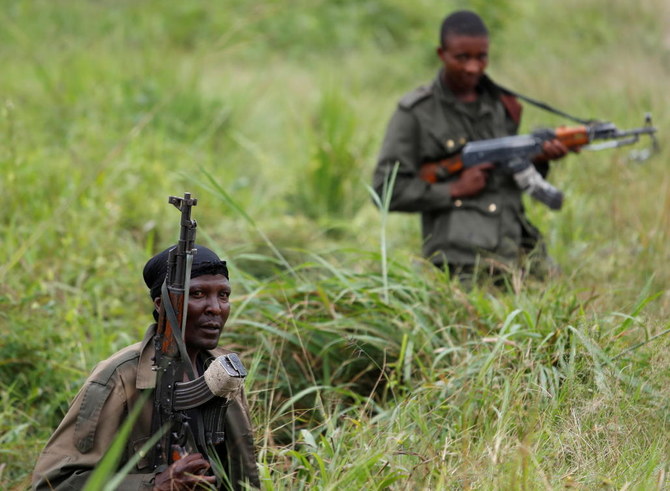
- A number of Chinese citizens had been attacked and kidnapped over the past month in the provinces of South Kivu, North Kivu and Ituri
PM Modi votes as India’s marathon election heats up

- Modi’s ruling Bharatiya Janata Party is expected to win India’s election convincingly
- Indian PM has stepped up rhetoric on India’s main religious divide in bid to rally voters
AHMEDABAD, India: Hindu nationalist Prime Minister Narendra Modi cast his ballot Tuesday in India’s ongoing general election after giving several inflammatory campaign speeches accused of targeting minority Muslims.
Turnout so far has dropped significantly compared with the last national poll in 2019, with analysts blaming widespread expectations that Modi will easily win a third term and hotter-than-average temperatures heading into the summer.
Modi walked out of a polling booth early morning in the city of Ahmedabad while holding up a finger marked with indelible ink, flanked by security personnel and cheered by supporters.
“Voted in the 2024 Lok Sabha elections,” Modi said on social media platform X, referring to India’s lower house of parliament.
“Urging everyone to do so as well and strengthen our democracy.”
The premier’s ruling Bharatiya Janata Party (BJP) is expected to win the election convincingly, but since the vote began on April 19, Modi has stepped up his rhetoric on India’s main religious divide in a bid to rally voters.
He has used public speeches to refer to Muslims as “infiltrators” and “those who have more children,” prompting condemnation from opposition politicians, who have complained to election authorities.
Modi has also accused Congress, the main party in the disparate opposition alliance competing against him, of planning to reallocate the nation’s wealth to Muslim households.
“This is the first time in a long time that he is so direct,” said Hartosh Singh Bal, executive editor at news magazine The Caravan.
“I haven’t seen him be this directly bigoted, usually he alludes to bigotry,” he added.
“The comments on wealth redistribution are targeting something from the Congress manifesto that just does not exist and that is frankly quite unfortunate.”
Modi remains widely popular a decade after coming to power, in large part due to his government’s positioning the nation’s majority faith at the center of its politics, despite India’s officially secular constitution.
In January, the prime minister presided over the inauguration of a grand temple to the deity Ram, built on the site of a centuries-old mosque razed by Hindu zealots decades earlier.
Construction of the temple fulfilled a long-standing demand of Hindu activists and was widely celebrated across India, with extensive television coverage and street parties.
Modi’s brand of Hindu-nationalist politics has in turn made India’s 220-million-plus Muslim population increasingly anxious about their future in the country.
The election commission has not sanctioned Modi for his remarks despite its code of conduct prohibiting campaigning on “communal feelings” such as religion.
India’s election is conducted in seven phases over six weeks to ease the immense logistical burden of staging the democratic exercise in the world’s most populous country.
Much of southern Asia was hit by a heatwave last week that saw several constituencies vote in searing temperatures.
In the city of Mathura, not far from the Taj Mahal, temperatures crossed 41 degrees Celsius (106 degrees Fahrenheit) on polling day, and election commission figures showed turnout dropping nearly nine points to 52 percent from five years earlier.
An analysis of turnout data published by The Hindu newspaper concluded it was too early to determine whether hot weather was impacting voter participation.
But India’s weather bureau has forecast more heatwave spells to come in May and the election commission formed a taskforce last month to review the impact of heat and humidity before each round of voting.
High temperatures were forecast for several locations voting on Tuesday including the states of Madhya Pradesh and Bihar.
Years of scientific research have found climate change is causing heatwaves to become longer, more frequent and more intense.
More than 968 million people are eligible to vote in the Indian election, with the final round of polling on June 1 and results expected three days later.
Ground invasion of Rafah would be ‘intolerable,’ UN chief warns

- Israel has killed more than 34,700 Palestinians, around two-thirds of them children and women, according to Gaza health officials
UNITED NATIONS, United States: A ground invasion of Rafah would be “intolerable,” UN Secretary-General Antonio Guterres said Monday, calling on Israel and Hamas “to go an extra mile” to reach a ceasefire deal.
“This is an opportunity that cannot be missed, and a ground invasion in Rafah would be intolerable because of its devastating humanitarian consequences, and because of its destabilizing impact in the region,” Guterres said as he received Italian President Sergio Mattarella.
UK military personnel’s data accessed in hack, BBC reports

- MPs could be informed about the development in the Commons on Tuesday
Some personal information in a payroll system used by Britain’s defense department has been accessed in a data breach, the BBC reported on Monday.
The system was managed by an external contractor and no operational Ministry of Defense data was obtained, the broadcaster said, adding that the department took the system off-line immediately.
Information like names and bank details of current and some former members of the Royal Navy, Army and Air Force was compromised, according to the report.
The Ministry of Defense did not immediately respond to a Reuters’ request for comment outside working hours.
MPs could be informed about the development in the Commons on Tuesday, the report added.
Russia says it takes control of two more settlements in eastern Ukraine
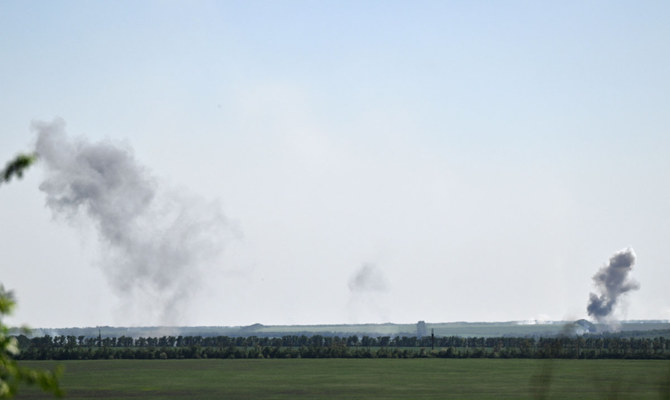
- Russia has made slow but steady advances since taking Avdiivka in February, with a string of villages in the area falling to Moscow’s forces
MOSCOW: Russian forces have taken control of the settlements of Soloviove in Ukraine’s eastern Donetsk region and Kotliarivka further north in the Kharkiv region, the defense ministry said on Monday.
Ukraine’s military made no mention of either locality in its evening General Staff report. Kharkiv Regional Governor Oleh Syniehubov said on Monday that Kotliarivka, located near the town of Kupiansk, was one of several locations to come under Russian shelling.
But Ukrainian bloggers appeared to acknowledge that both villages were in Russian hands.
DeepState, a popular forum on the war, noted on Saturday that Kotliarivka had been captured by Russian forces and on Sunday said the neighboring village of Kyslivka was also in Russian hands.
DeepState reported that Soloviove, northwest of the Russian-held town of Avdiivka, had been taken by Russian forces last week.
Russia has made slow but steady advances since taking Avdiivka in February, with a string of villages in the area falling to Moscow’s forces.
UNICEF warns 600,000 children face ‘catastrophe’ in Rafah
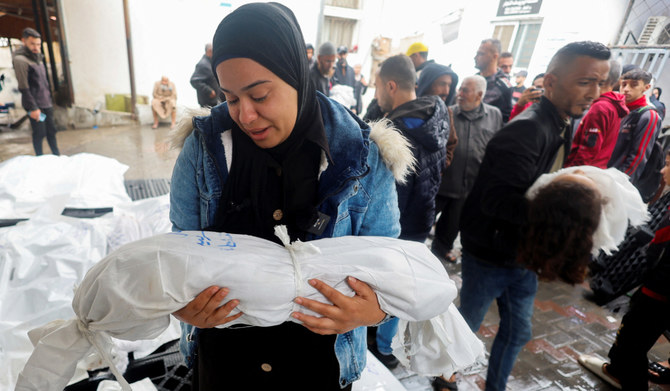
- Calling again for a ceasefire and safe access for humanitarian organizations, the agency highlighted there are some 78,000 infants under age two sheltering in the city, along with 175,000 children under five who are affected by infectious disease
- Israel has killed more than 34,000 Palestinians in Gaza, mostly women and children, according to the health ministry in the Hamas-run territory
NEW YORK: Some 600,000 children packed into Gaza’s Rafah city face “further catastrophe,” UNICEF warned on Monday, urging against their forced relocation after Israel ordered an evacuation ahead of its long-threatened ground invasion.
“Given the high concentration of children in Rafah ... UNICEF is warning of a further catastrophe for children, with military operations resulting in very high civilian casualties and the few remaining basic services and infrastructure they need to survive being totally destroyed,” the UN children’s agency said in a statement.
It said Gaza’s youth were already “on the edge of survival,” with many in Rafah — where the agency said the population has soared to 1.2 million people, half of them children — already displaced multiple times and with nowhere else to go.
“More than 200 days of war have taken an unimaginable toll on the lives of children,” said UNICEF Executive Director Catherine Russell.
“Rafah is now a city of children, who have nowhere safe to go in Gaza,” she said, warning that a large-scale military operation by Israel would bring “chaos and panic, and at a time where (children’s) physical and mental states are already weakened.”
UNICEF estimates that Rafah’s population has swelled to nearly five times its normal figure of 250,000 residents.
Calling again for a ceasefire and safe access for humanitarian organizations, the agency highlighted there are some 78,000 infants under age two sheltering in the city, along with 175,000 children under five who are affected by infectious disease.
Gaza’s bloodiest-ever war began following Hamas’s unprecedented Oct. 7 attack on Israel.
Israel has conducted a retaliatory offensive that has killed at least 34,735 people in Gaza, according to the Hamas-run
territory’s Health Ministry.
Of that toll, more than 14,000 are children, the ministry has said.
Israeli Prime Minister Benjamin Netanyahu has vowed to send ground troops into Rafah regardless of any truce, despite concerns from the US, other countries, and aid groups.
Hamas official Izzat Al-Rashiq said in a statement that any Israeli operation in Rafah would put the truce talks in jeopardy.
Senior Hamas official Sami Abu Zuhri said the evacuation order was a “dangerous escalation” that would have consequences.
“The US administration, alongside the occupation, bears responsibility for this terrorism,” the official said.
Hamas said later in a statement that any offensive in Rafah would not be a “picnic” for Israeli forces and said it was fully prepared to defend Palestinians there.
Aid agencies have warned that the evacuation order will lead to an even worse humanitarian disaster in the crowded coastal enclave of 2.3 million people reeling from seven months of war.
“Forcing 1 million displaced Palestinians from Rafah to evacuate without a safe destination is not only unlawful but would lead to catastrophic consequences,” British charity ActionAid said.
Nick Maynard, a British surgeon trying to leave Gaza on Monday, said in a voice message from the Gaza side of the Rafah crossing into Egypt: “Two huge bombs have just gone off immediately outside the crossing. There’s a lot of gunfire as well about 100 meters from us. We are very unclear whether we will get out.”
“Driving through Rafah, the tension was palpable with people evacuating as rapidly as they could.”
Witnesses said the areas in and around Rafah where Israel wants to move people are already crowded with little room for more tents.
“The biggest genocide, the biggest catastrophe, will take place in Rafah. I call on the whole Arab world to interfere for a ceasefire — let them interfere and save us from what we are in,” said Aminah Adwan, a displaced Palestinian.
Israel has been threatening to launch incursions in Rafah, which it says harbors thousands of Hamas fighters and potentially dozens of hostages.
Victory is impossible without taking Rafah, it says.



